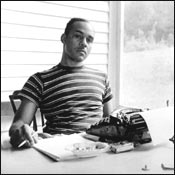
For the poetry of it, Ralph Ellison taped himself reading from his novel-in-progress and then played the recordings to get into the rhythm of whatever passage he was reworking – his parabolas, trajectories, and riffs on race, identity, language, and kinship. From a home-movie snippet included in Avon Kirkland’s absorbing and perplexing “American Masters” documentary, Ralph Ellison: An American Journey, Ellison seems to have enjoyed listening to himself. But obviously not enough. Even after more than 40 years of fine-tuning, he never finished that second novel. At his death in 1994, he left behind 2,000 unruly pages, from which his literary executor, John F. Callahan, would decoct Juneteenth, the synecdoche so many of us complained about a couple of years of ago.
Never mind. Just wait till you see Toni Morrison read from Juneteenth at a downtown Barnes & Noble where Kirkland waits with camera. This is after we have watched Ralph grow up in Oklahoma, discover T. S. Eliot at Tuskegee, meet Richard Wright in Harlem, write one of the great novels of the century, Invisible Man, and find himself so festooned with merit badges of official culture that he would actually be called an Uncle Tom in the bloodthirsty sixties. It’s after we have looked at dramatizations of a handful of scenes from Invisible Man, and heard from Jervis Anderson, Stanley Crouch, Morris Dickstein, Farah Griffin, R. W. B. Lewis, Albert Murray, Terrence Rafferty, Shelby Steele, Clyde Taylor, and Cornel West – not to mention Amiri Baraka, who is still bad-mouthing Ellison.
And we are probably asking ourselves what it is about American autobiography that runs away from second acts; and about American literature that insists on a masterpiece every time out, all or nothing; and about aggrieved and beleaguered minority cultures that want all their artists wearing the same uniform and shooting in the same direction. But then Morrison reads some Ellison aloud, and we’ve no reason to be anything other than grateful. Whatever failures of coherence he may have experienced among his many drafts, he remained to the end the greatest jazz sermonizer and blues guitarist ever to write fiction. And what he seemed to be trying to give us was some sort of American gumbo version of the structuralist myth of “The Stolen Child.”
I’m sorry he chose not to march on Washington or Selma. And that he so seldom encouraged younger black writers whose own ambitions had been nourished by his breakthrough book. And that he ended up being more comfortable in LBJ’s White House, or visiting West Point, or at the Century Club, than on those streets where Tod Clifton bled to death in Invisible Man. But even the fragmentary Juneteenth – Lincoln-haunted, Oedipus-inflected dialectic of masked pasts and screened memories; call-and-response antiphony of flimflams; matched fall of twinned tricksters into shared mystery, lost history, and filmed illusions where, as in Faulkner, the past just keeps on happening – is so expansive as to make plenty of room for everybody else.
Such as A. Philip Randolph, the socialist labor-union organizer and editor who, with the help of 10,000 Black Men Named George, created the Brotherhood of Sleeping Car Porters. In a Black History Month of remarkable television, add André Braugher as Randolph, who would also become in time perhaps a little too respectable. And Angela Bassett, in The Rosa Parks Story, who trains for the moment she will refuse to move to the back of a Montgomery bus and thus begin a boycott that begets a revolution. What Bassett accomplishes as Parks is the kind of heroism so difficult that it ought to have been impossible.
I sometimes think that Ellison couldn’t finish his second novel because he needed a happy ending – and the America he saw from his tower, lacking radiance, had decided not to oblige. It is possible, however, to turn the lens around and look the other way: The fiction of Ralph Ellison, the inspiration of Rosa Parks, are gifts we don’t deserve. “The best art,” Toni Morrison told us, “is unquestionably political and irrevocably beautiful at the same time.” To which we should also add some James Baldwin: “If I am not who you say I am, then you are not who you think you are.”
Ralph Ellison: An American Journey
Tuesday, February 19; 9 to 10:30 p.m.; Channel 13.
10,000 Black Men Named George
Sunday, February 24; 8 to 9:30 p.m.; Showtime.
The Rosa Parks Story
Sunday, February 24; 9 to 11 p.m.; CBS.